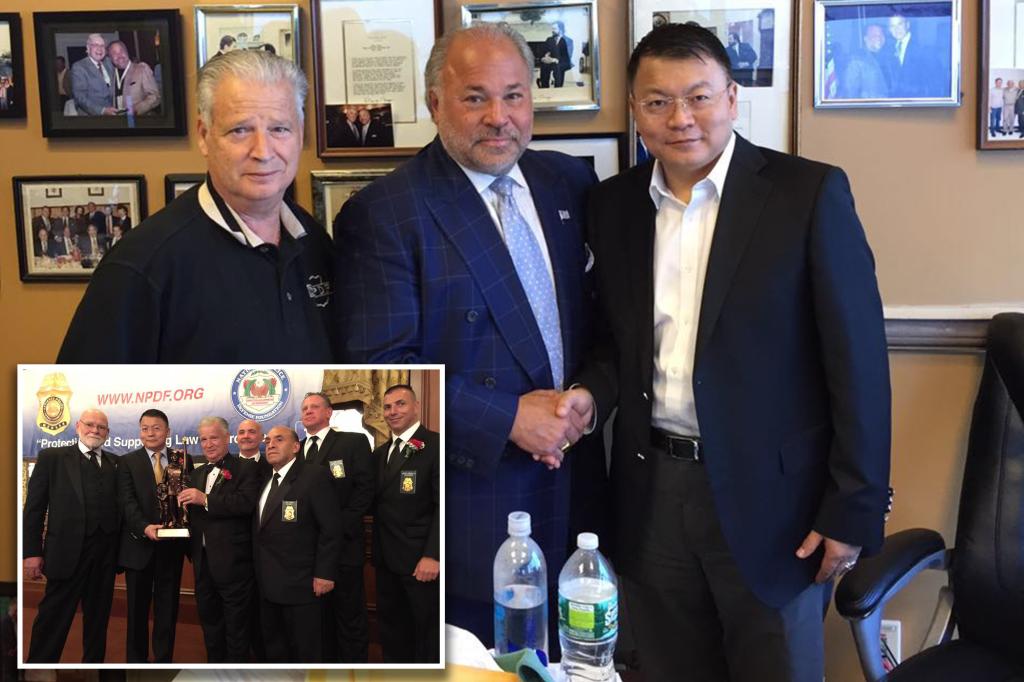The National Police Defense Foundation (NPDF), a US non-profit ostensibly supporting law enforcement, has been implicated in a complex web of connections with Chinese officials, raising concerns about potential Chinese Communist Party (CCP) influence operations within American law enforcement circles. At the center of this controversy is Joseph Occhipinti, the NPDF’s founder, and his relationship with Liu Wei, identified as a high-ranking Chinese intelligence agent and head of China Security and Protection Company Ltd (CSP). This relationship, spanning over two decades, involved financial contributions from Liu to the NPDF, awards bestowed upon Liu by the organization, and introductions facilitated by the NPDF connecting Liu to US security officials and private investigators.
The timeline of events reveals a deepening entanglement between the NPDF and Chinese interests, coinciding with the CCP’s increasing focus on suppressing dissent abroad. In 2015, the same year that Xi Jinping launched Operation Fox Hunt, a program targeting overseas dissidents, Liu donated $10,000 to the NPDF and was subsequently recognized with the organization’s Distinguished Member Award. The NPDF also publicly designated Liu as its “delegate to China.” This period saw growing concerns from the FBI about Chinese intelligence efforts to infiltrate US law enforcement to monitor and potentially repress Chinese nationals residing in the United States.
Liu’s company, CSP, boasts close ties to the CCP, having provided security for significant party events. The NPDF facilitated Liu’s introduction to Bo Dietl, a former NYPD detective turned private investigator, leading to a business partnership in 2016 where CSP acquired a significant stake in Dietl’s firm. Furthermore, the NPDF organized trips to China for its members, including Occhipinti, and Liu’s daughter reportedly stayed with the Occhipinti family during her high school years in the US. These personal connections further solidified the relationship between the NPDF leadership and the Chinese intelligence operative.
The NPDF’s activities extended beyond facilitating business deals and fostering personal relationships. The organization actively lobbied US politicians on Liu’s behalf, securing a proclamation honoring him for promoting positive police relations between the US and China. This lobbying effort demonstrates the NPDF’s willingness to leverage its influence within American political circles to advance the interests of a suspected Chinese intelligence agent. Simultaneously, the NPDF hosted gala dinners attended by high-ranking US officials from agencies like the Secret Service, Homeland Security, and the Bureau of Alcohol, Tobacco, and Firearms, providing further opportunities for interaction with individuals connected to Chinese intelligence.
Adding another layer to the NPDF’s controversial connections is its involvement with Chinese community patrols in New York City. Occhipinti collaborated with Su Junan, an NPDF liaison with ties to Chinese United Front organizations, known for their intelligence gathering and CCP promotion activities. Together, they established community patrols involving active and retired military personnel and officers, even securing training assistance from a Homeland Security agent. This collaboration raises concerns about the potential for Chinese influence within community policing initiatives and the blurring of lines between community engagement and intelligence operations.
Occhipinti maintains that his interactions with Liu and other Chinese officials were conducted during a period of positive US-China relations and that the NPDF has been transparent with the FBI about these relationships. However, the convergence of the NPDF’s activities with the CCP’s Operation Fox Hunt and the increasing evidence of Chinese intelligence operations targeting US-based dissidents casts a shadow over these claims. The NPDF’s acceptance of financial contributions from a suspected intelligence agent, its lobbying efforts on his behalf, and its involvement with individuals connected to United Front organizations raise serious questions about the organization’s susceptibility to foreign influence and its potential role in facilitating Chinese intelligence operations on American soil. The situation underscores the complex challenges posed by foreign influence operations and the need for heightened scrutiny of organizations that engage with foreign entities, particularly those with ties to governments known for suppressing dissent and engaging in espionage activities.

